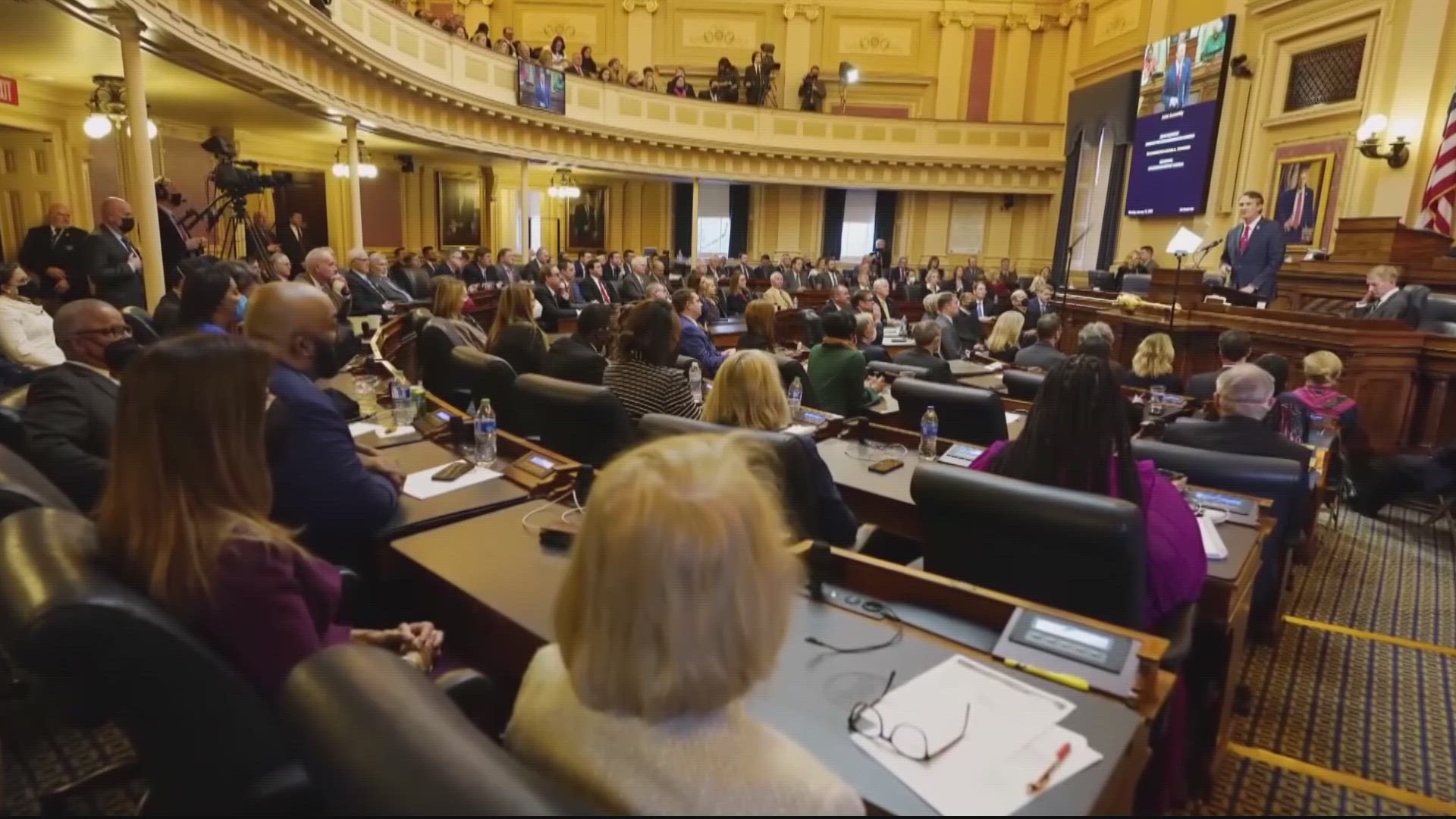NORFOLK, Va. — With just a day until the 2023 general elections in Virginia, predictions on race outcomes in the General Assembly and how they will affect party control of the state government remain a nail-biter.
This election is the first time since 2019 that all 140 seats in the General Assembly are on the ballot. One hundred of those seats are in the Republican-controlled House of Delegates, and 40 are in the Democrat-controlled Senate. It's also the first election under newly-drawn district maps.
Gov. Glenn Youngkin has been campaigning for Republican candidates across the state and encouraging Virginians to vote early, pushing for a "Republican trifecta" in state government that will support his legislative priorities for the remainder of his term as governor.
But how likely is it that Republicans will win full control of both the Virginia Senate and House of Delegates? Some experts think they may have an uphill battle compared to Democrats for several reasons.
Here are three factors that play into what's happening in this year's election, according to J. Miles Coleman, the associate editor of Sabato's Crystal Ball at the UVA Center for Politics.
Democrats have a higher ceiling than Republicans in new districts
The 2021 Virginia elections were the first time since 2009 that a Republican candidate won the governor's house, with Youngkin defeating Democrat Terry McAuliffe 50% to 48%. The election also saw the GOP retake the House of Delegates with a slim 52-seat majority.
But Coleman said those elections may have been the ceiling for Republicans, especially considering how Democrats have performed in other recent elections.
For example, in the 2020 presidential election, Democrat Joe Biden won Virginia over then-President Donald Trump 54% to 44%.
Looking at past elections broken down by the newly drawn districts, if they existed before this year, Coleman said Biden would have carried 59 House districts and 24 Senate districts. In the 2021 governor's election, Youngkin would have carried 52 House districts and 20 Senate districts.
"Going by the basic partisanship of the districts, Democrats just have more ways to get to a majority," Coleman said. "Youngkin did just about everything right and replicating his numbers would only get Republicans to a small majority."
Coleman said the Republicans' House victory in 2021 may have been on the coattails of Youngkin's victory. But without him on the ballot, Republicans may have a hard time even maintaining the slim majority in the House, especially in a national environment Coleman says is less conducive to them.
Abortion has complicated the national environment for Republicans since 2021
In the 2021 Virginia elections, Republicans benefited from Biden's low approval ratings, but since then, the Supreme Court overturned the landmark abortion rights Roe v. Wade case in the summer of 2022.
The high court's decision has since energized Democrats nationwide in subsequent elections as several states have passed restrictions on the procedure.
For example, Democrats overperformed in the 2022 U.S. House election, only losing nine seats, despite expectations that it would be a wipeout for them. In Virginia, Democratic candidates defeated their Republican challengers in two out of three competitive U.S. House elections, largely by campaigning on protecting abortion rights.
"The Democrats were able to have a decent midterm, and I think [the abortion issue] put some wind in their sails to win into this year," Coleman said.
This year, Republican candidates are largely campaigning on passing a 15-week ban on abortion proposed by Youngkin, who has framed it as a reasonable compromise between party positions that most people could get behind. But it's not clear if the messaging strategy will work among Virginia's electorate.
A recent poll from the Wason Center at Christopher Newport University showed that 54% of Virginians either oppose or strongly oppose the proposed ban, while 39% either support or strongly support it.
Despite Youngkin's popularity, voters may not want to give GOP full control
The Wason Center poll also shows that Youngkin has an approval rating of 55% among Virginians. But support for his priorities is more of a mixed bag.
For example, a large majority of voters polled said they support the Youngkin administration's policies for transgender students, including requiring parental notification if a student wants to go by pronouns that differ from their birth certificate.
However, when it comes to the Youngkin administration's withdrawal from the Regional Greenhouse Gas Initiative (RGGI), which caps carbon dioxide emissions from power plants across 11 states, a large majority said they support staying in the program.
Because Virginia has trended Democratic in recent elections, Coleman questioned if voters would give Youngkin a Republican trifecta, saying his high poll numbers may reflect that he's a different kind of Republican but not necessarily support for his conservative policies.
"He hasn't been able to maybe be as conservative as he would like because of the split legislature," Coleman said. "I think [Virginia] may have a subset of voters, at least in some of these competitive seats, that maybe like the idea of divided government but don't want to give Republicans everything."
While Youngkin is popular, the Wason Center poll found that 42% of Virginians would vote for Democratic candidates, while 41% would vote for Republicans.

